Plot
Harry Perkins, an unassuming, working class, very left-wing Leader of the Labour Party and Member of Parliament for Sheffield Central, becomes Prime Minister in March 1991 after his party wins a landslide majority in that year's general election, defeating the incumbent Conservative government beleaguered by a banking sector crisis. The priorities of the Perkins Government include dissolving all newspaper monopolies, withdrawal from NATO, removing all American military bases on UK soil, unilateral nuclear disarmament, and true open government. Newspaper magnate Sir George Fison, with allies within British political and Civil Service circles, moves immediately to discredit him, with the United States the key, but covert, conspirator. The most effective of the Prime Minister's domestic enemies is the aristocratic Sir Percy Browne, Head of MI5, whose ancestors "unto the Middle Ages" have exercised subtle power behind the scenes. However, Perkins finds support in Joan Cook, his Home Secretary; Fred Thompson, his Press Secretary; Inspector Page, his police bodyguard; and Sir Montague Kowalski, the Chief Scientific Adviser to the Ministry of Defence.
Marcus Morgan, the US Secretary of State, visits London to try to persuade Perkins of his country's need of a nuclear deterrent, suggesting that American financial assistance in repairing the British economy is conditional upon the abandonment of his defence policies. However, as Perkins undiplomatically rejects his pleas, asserting that his government has a mandate to enact said policies, severe financial pressure is applied to Britain in retaliation for his actions. The government turns to the International Monetary Fund (IMF), which agrees to help, but only on condition that expenditure be cut by £10,000,000,000, which would force Perkins to abandon most of his spending commitments. While the IMF offer is being debated in Cabinet, Perkins receives a call from his Foreign Secretary Tom Newsome, who has been having meetings in Sweden, and is able to announce that the International State Bank of Moscow has agreed to lend the money without preconditions. [3] In retaliation, Newsome's affair with Maureen Jackson, a member of the Hampstead Labour Party, is reported by Fison's newspapers, alleging that she posed a security risk owing to spurious IRA connections. Newsome is forced to resign from the Cabinet and his wife commits suicide after being harassed by journalists. During Annette's funeral, Thompson, fearing a smear campaign against the Perkins ministry, asks Perkins if rumours about him being a homosexual are true; Perkins patiently denies the accusation, stating that he had a brief relationship years earlier with a woman who later married someone else, and who had corresponded with him after he became Prime Minister.
Failed negotiations between the government and trade unions to formulate an economic strategy result in working-to-rule by the United Power Workers' Union purportedly over job losses that the adoption of alternative energy might incur. The resultant blackouts seriously damage public opinion of the Perkins Government. Thompson, with the aid of his aristocratic girlfriend Elizabeth Fain, outlines the members of the conspiracy, including the moderate, politically ambitious Chancellor of the Exchequer Lawrence Wainwright, who lost the last Labour leadership election to Perkins two years before. With this information, Perkins bluffs Wainwright into ending the strike by threatening either to investigate his connections with his co-conspirators via a public inquiry, or leak information about them to the press. With the crisis swiftly resolved, Wainwright is demoted to Northern Ireland Secretary and Cook is promoted to Chancellor of the Exchequer.
The Perkins Government's policies for nuclear disarmament and neutrality, despite the live national broadcast of the disarming of a nuclear warhead, are hampered by the Chiefs of Staff fudging the figures regarding British, Allied and Warsaw Pact military capabilities, representatives of the United States government and armed forces claiming that the removal of US military bases can only be achieved after five years (after the latest possible date for the next general election), and the covert assassination of Sir Montague staged as a road accident.
Browne presents Perkins with forged evidence of financial irregularity suggesting that he had accepted £300,000 from the Soviet government as part of loan negotiations with the International State Bank of Moscow. Implicated in the allegation is Helen Spencer (née Jarvis), a financial advisor who revealed to Perkins illegal dealings in the City which brought about the banking sector crisis which helped Perkins win the last election, who helped negotiate the Moscow State Bank deal, and with whom Perkins was in a relationship years earlier; MI5 manages to ensure her silence on the subject after Browne's assistant Fiennes issues veiled threats to her. With the groundwork having been laid by Fison with manufactured press speculation over Perkins's health and fake opinion polls suggesting overwhelming public support for a Wainwright premiership, Browne blackmails Perkins into resigning on grounds of ill health, suggesting that the forged evidence will be leaked to the press if he does not comply. Although Perkins calmly agrees to Browne's demands, he uses a televised address broadcast live and on all channels meant for the announcement of his resignation to instead expose the attempted blackmail and announce both an early general election (which Perkins frames as a referendum on British democracy) and a public inquiry. Senior Army officers and security service officials watch in silence.
The final sequence, on the morning of the election, is deliberately ambiguous, but implies that a military coup has begun: a polling station is shown with the screen becoming obscured by the shadow of a tank, the quiet of the early morning is disrupted by the noise of a helicopter, and a news broadcast states that 'authorities at Buckingham Palace' would 'clarify the constitutional situation'. The scene quickly cuts to black.
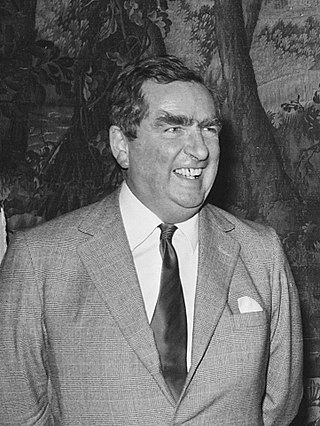
Denis Winston Healey, Baron Healey, was a British Labour Party politician who served as Chancellor of the Exchequer from 1974 to 1979 and as Secretary of State for Defence from 1964 to 1970; he remains the longest-serving Defence Secretary to date. He was a Member of Parliament from 1952 to 1992, and was Deputy Leader of the Labour Party from 1980 to 1983. To the public at large, Healey became well known for his bushy eyebrows, his avuncular manner and his creative turns of phrase.

Emanuel Shinwell, Baron Shinwell, was a British politician who served as a government minister under Ramsay MacDonald and Clement Attlee. A member of the Labour Party, he served as a Member of Parliament (MP) for 40 years, for Linlithgowshire, Seaham and Easington respectively.

Desmond Henry Browne, Baron Browne of Ladyton, is a Scottish politician who served in the Cabinet of the United Kingdom under Tony Blair and Gordon Brown as Secretary of State for Defence 2006 to 2008 and Secretary of State for Scotland from 2007 to 2008. A member of the Labour Party, he was Member of Parliament (MP) for Kilmarnock and Loudoun from 1997 to 2010.

Christopher John Mullin is a British journalist, author and Labour politician.

Maria Eagle is a British politician who served in the governments of Tony Blair and Gordon Brown. She later served in the Shadow cabinets of Ed Miliband and Jeremy Corbyn. A member of the Labour Party, she has been Member of Parliament (MP) for Garston and Halewood, previously Liverpool Garston, since 1997.
A war cabinet is a committee formed by a government in a time of war to efficiently and effectively conduct that war. It is usually a subset of the full executive cabinet of ministers, although it is quite common for a war cabinet to have senior military officers and opposition politicians as members.
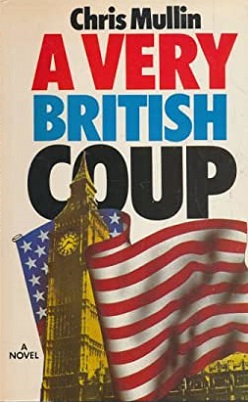
A Very British Coup is a 1982 novel by British Labour politician Chris Mullin. The novel has twice been adapted for television; as A Very British Coup in 1988 and as Secret State in 2012.
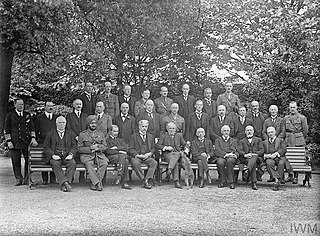
Liberal David Lloyd George formed a coalition government in the United Kingdom in December 1916, and was appointed Prime Minister of the United Kingdom by King George V. It replaced the earlier wartime coalition under H. H. Asquith, which had been held responsible for losses during the Great War. Those Liberals who continued to support Asquith served as the Official Opposition. The government continued in power after the end of the war in 1918, though Lloyd George was increasingly reliant on the Conservatives for support. After several scandals including allegations of the sale of honours, the Conservatives withdrew their support after a meeting at the Carlton Club in 1922, and Bonar Law formed a government.
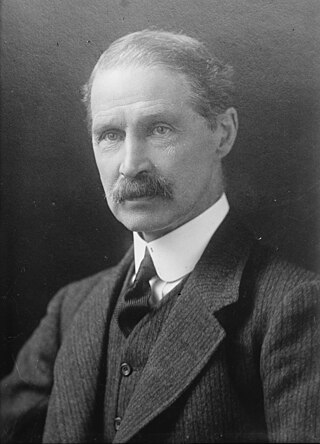
The Conservative Government of the United Kingdom that began in 1922 and ended in 1924 consisted of two ministries: the Law ministry and then the first Baldwin ministry.

James George Hacker, Baron Hacker of Islington,, BSc (Lond.), Hon. D. Phil (Oxon.) is a fictional character in the 1980s British sitcom Yes Minister and Yes, Prime Minister. He is the minister of the fictional Department of Administrative Affairs, and later Prime Minister of the United Kingdom. He was portrayed originally by Paul Eddington, with David Haig taking on the part for the 2013 revival.
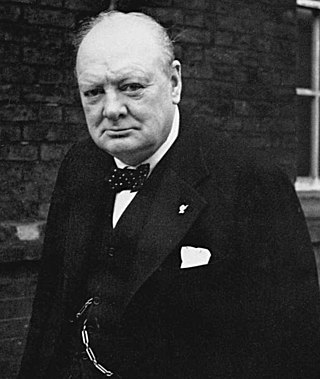
Winston Churchill formed the third Churchill ministry in the United Kingdom following the 1951 general election. He was reappointed as Prime Minister of the United Kingdom by King George VI and oversaw the accession of Queen Elizabeth II in 1952 and her coronation.

The Conservative government of the United Kingdom that began in 1957 and ended in 1964 consisted of three ministries: the first Macmillan ministry, second Macmillan ministry, and then the Douglas-Home ministry. They were respectively led by Harold Macmillan and Sir Alec Douglas-Home, who were appointed by Queen Elizabeth II.
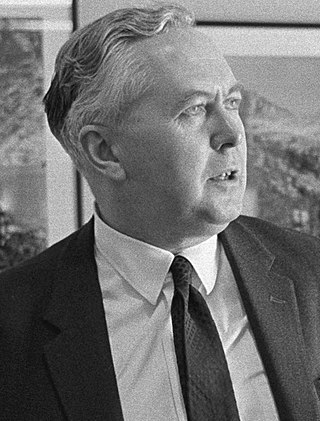
Since the mid-1970s, a variety of conspiracy theories have emerged regarding British Labour Prime Minister Harold Wilson, who served as the prime minister of the United Kingdom from 1964 to 1970 and 1974 to 1976. These range from Wilson having been a Soviet agent, to Wilson being the victim of treasonous plots by conservative-leaning elements in MI5 and the British military, claims which Wilson himself made.

The Falklands Play is a dramatic account of the political events leading up to, and including, the 1982 Falklands War. The play was written by Ian Curteis, an experienced writer who had started his television career in drama, but had increasingly come to specialise in dramatic reconstructions of history. It was originally commissioned by the BBC in 1983, for production and broadcast in 1986, but was subsequently shelved by Controller of BBC One Michael Grade due to its pro-Margaret Thatcher stance and alleged jingoistic tone. This prompted a press furore over media bias and censorship. The play was not staged until 2002, when it was broadcast in separate adaptations on BBC Television and Radio. It was aired again on BBC4, 1 December 2020, over 18 years after it was last transmitted.
There is a long history of close cooperation between the United States and the United Kingdom intelligence services; see Clandestine HUMINT and Covert Action for World War II and subsequent relationships. There are permanent liaison officers of each country in major intelligence agencies of the other, such as the Central Intelligence Agency (CIA) and the Secret Intelligence Service ("MI6"), FBI and the Security Service (MI5), and National Security Agency (NSA) and Government Communications Headquarters (GCHQ). From 1943 to 2017, the Open Source Enterprise, a division of the CIA, was run out of Caversham Park in Reading, Berkshire. American officials worked closely with their British counterparts to monitor foreign TV and radio broadcasts, as well as online information.

John Matthew Patrick Hutton, Baron Hutton of Furness, is a British politician who served in several offices in the Cabinet of the United Kingdom. He was Work and Pensions Secretary from 2005 to 2007, Business Secretary from 2007 to 2008, and Defence Secretary from 2008 to 2009. A member of the Labour Party, Hutton served as Member of Parliament (MP) for Barrow and Furness from 1992 to 2010.
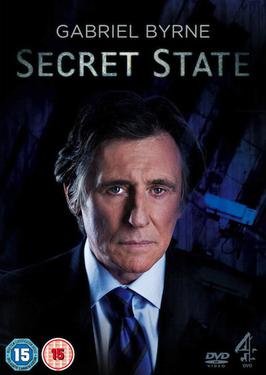
Secret State is a 2012 British four-part political thriller, starring Gabriel Byrne, Charles Dance and Gina McKee, and inspired by Chris Mullin's 1982 novel A Very British Coup. It delves into the relationship between a democratically elected government, the military and big business. The first episode premiered on Channel 4 on 7 November 2012, with the other three parts being shown over the following three weeks.

The Campaign for Nuclear Disarmament (CND) is an organisation that advocates unilateral nuclear disarmament by the United Kingdom, international nuclear disarmament and tighter international arms regulation through agreements such as the Nuclear Non-Proliferation Treaty. It opposes military action that may result in the use of nuclear, chemical or biological weapons, and the building of nuclear power stations in the UK.
Cultural depictions of prime ministers of the United Kingdom have become commonplace since the term's first use in 1905. However, they have been applied to prime ministers who were in office before the first use of the term. They are listed here chronologically from the date of first appointment as prime minister.















